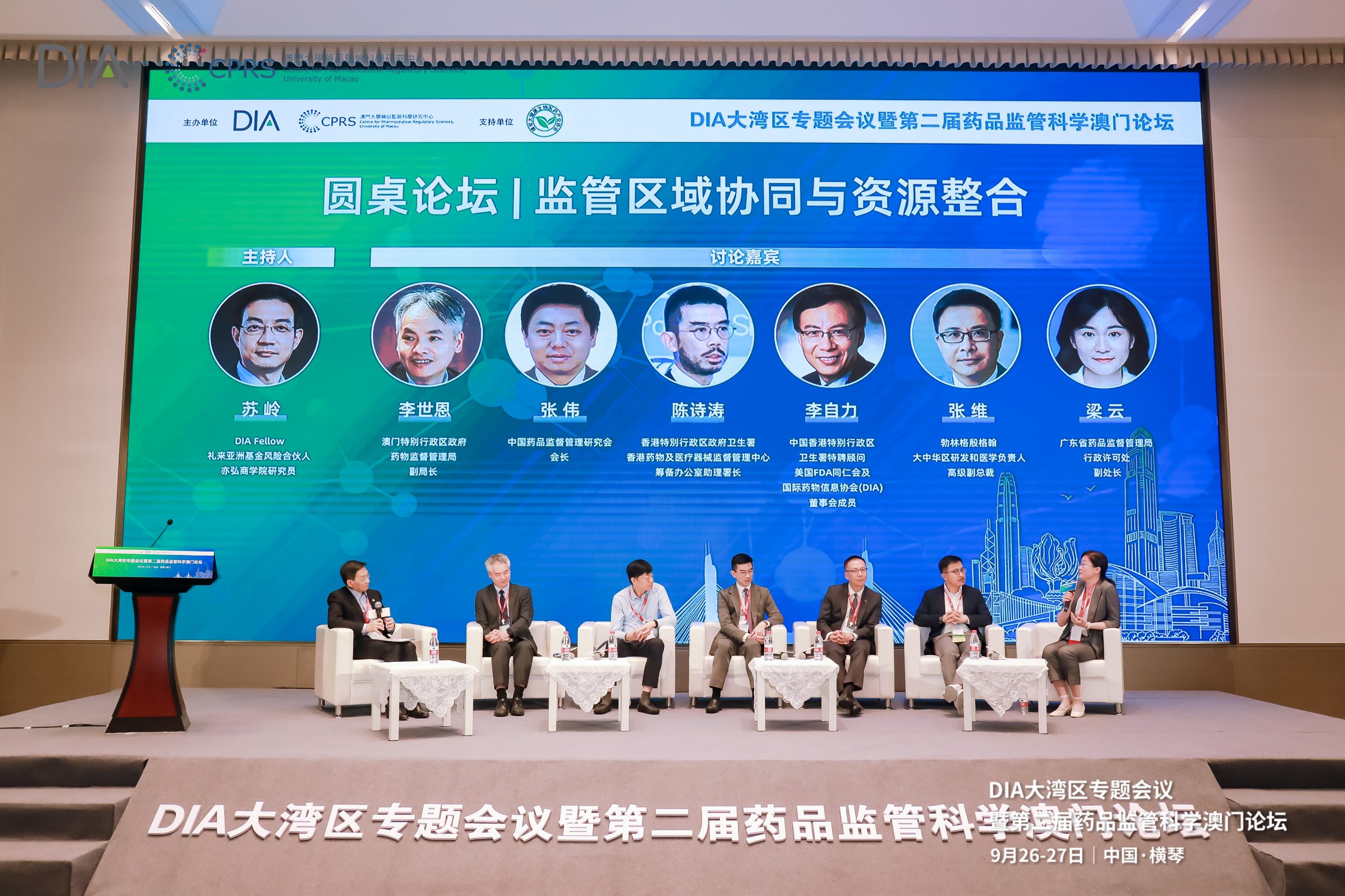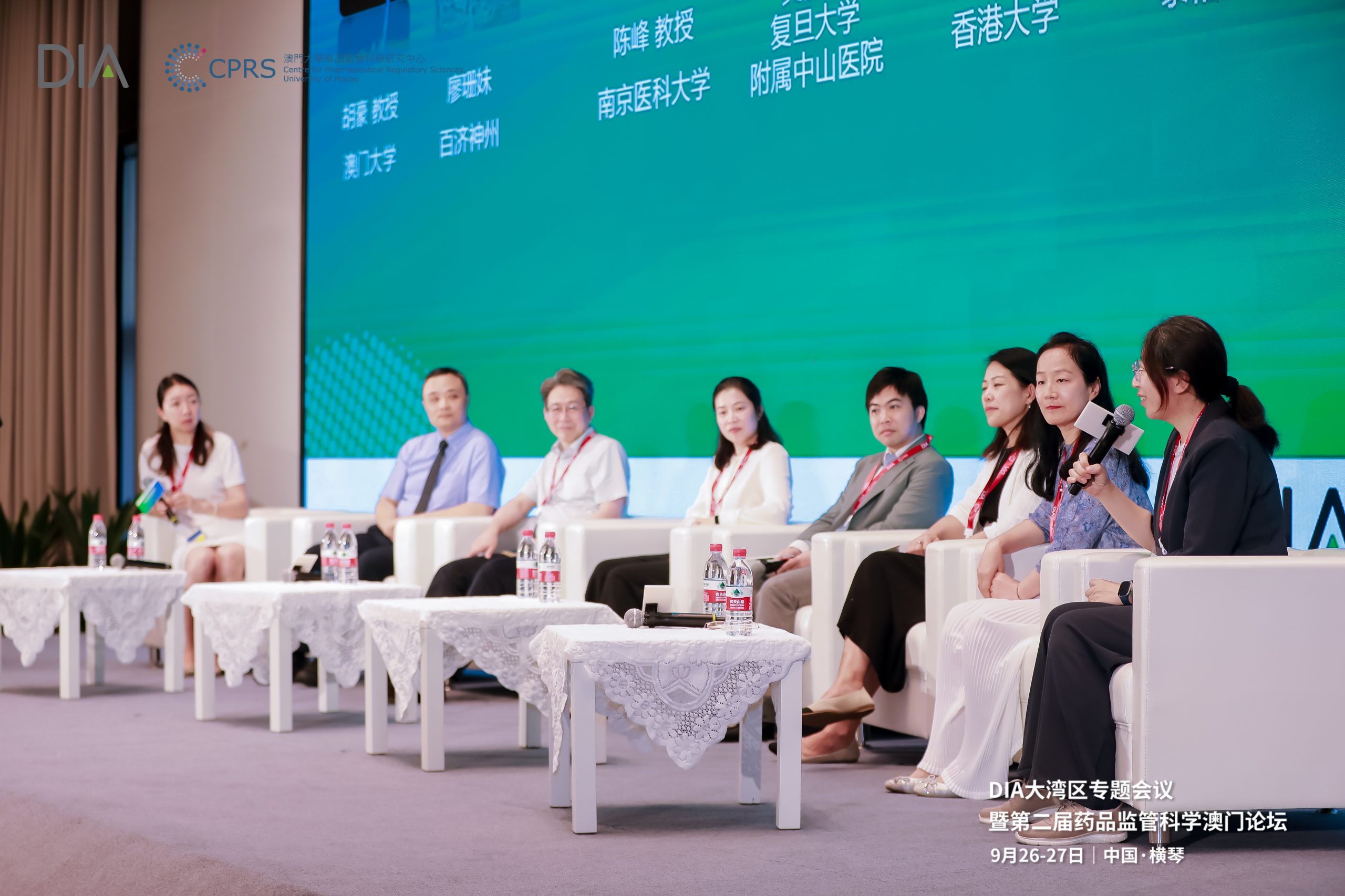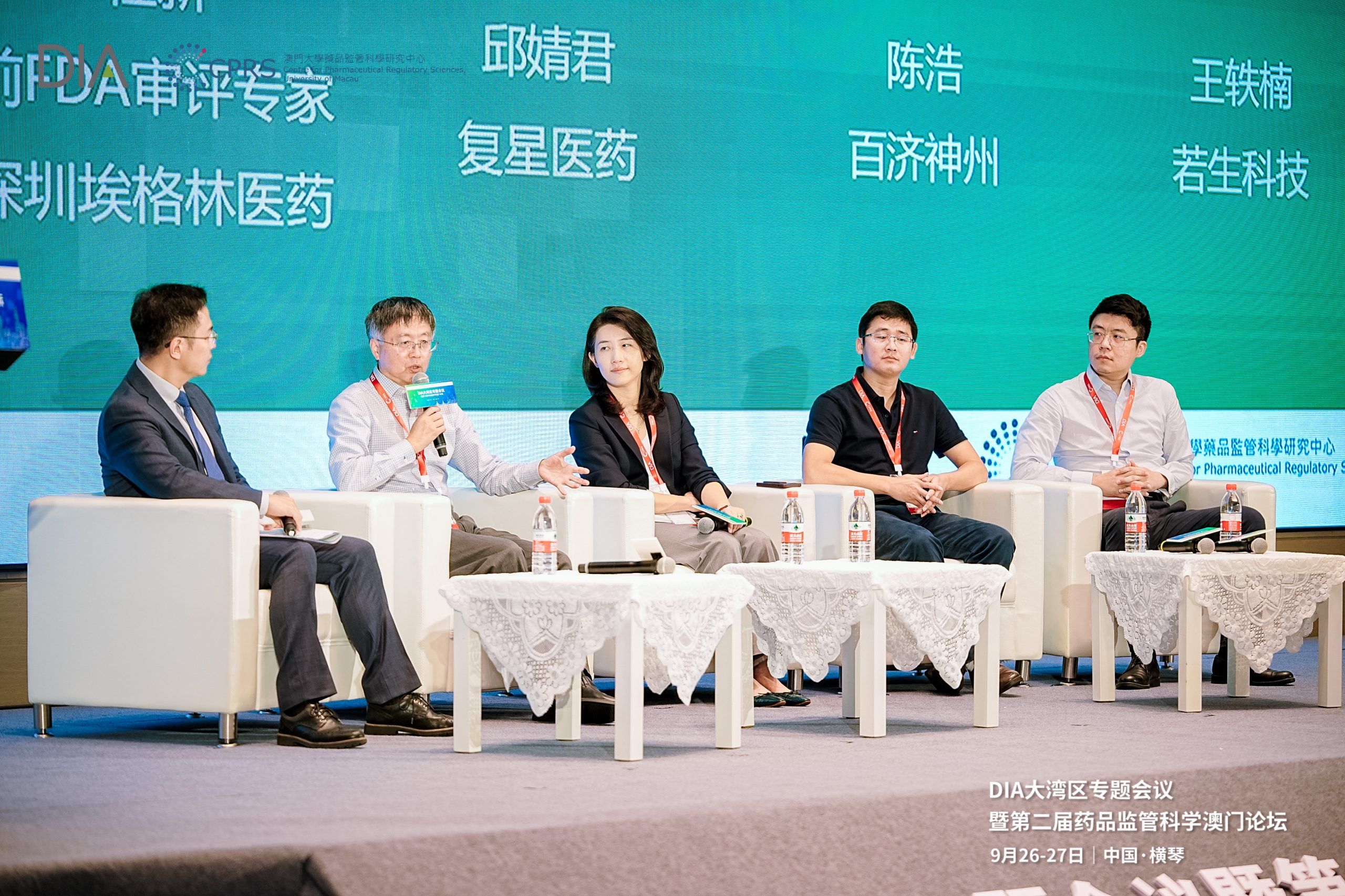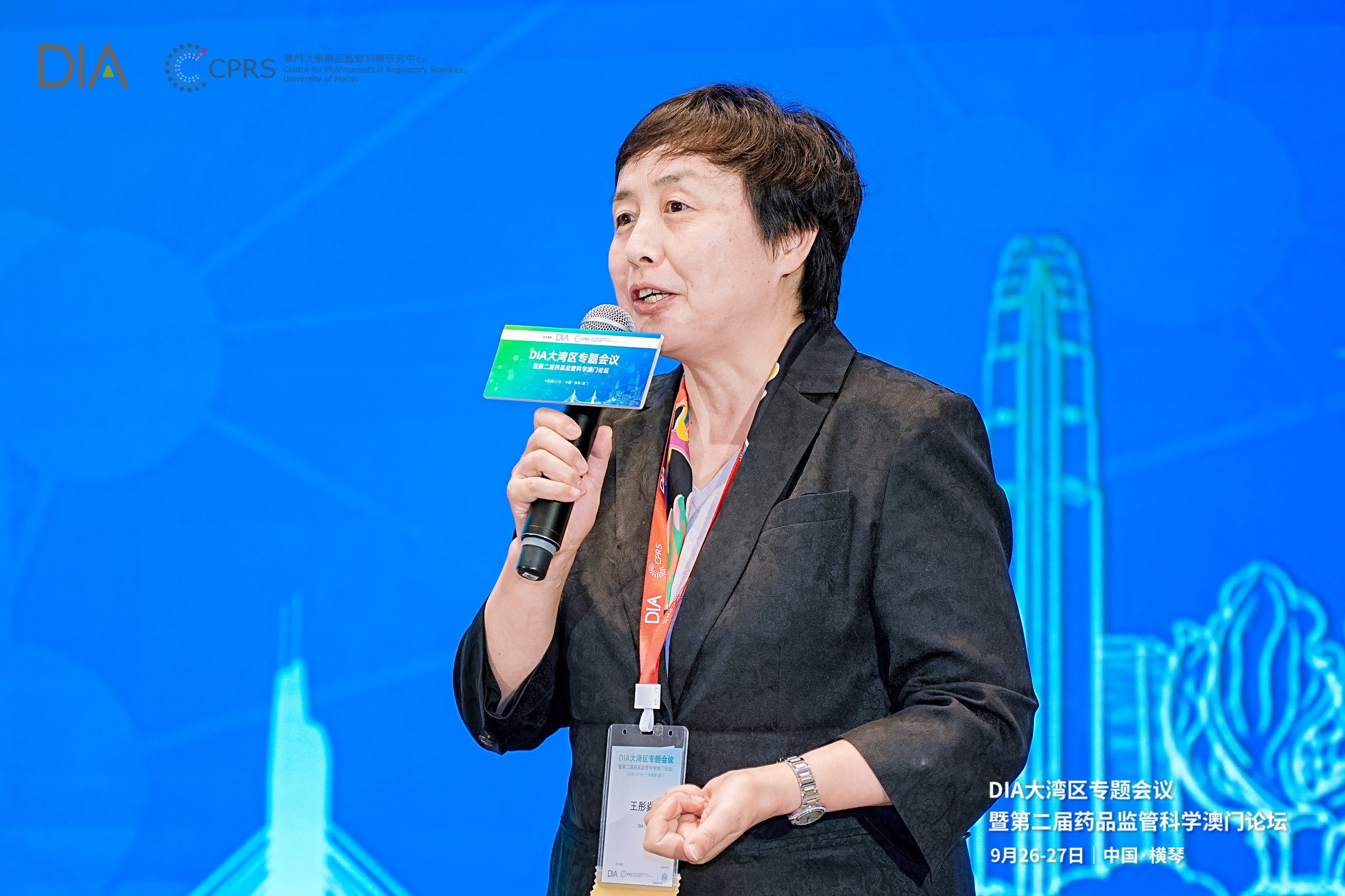
Group photo of the guests at the opening ceremony
The “2nd Macau Forum on Pharmaceutical Regulatory Science & DIA Special Conference on the Greater Bay Area,” co-hosted by the Centre for Pharmaceutical Regulatory Sciences (CPRS) at the University of Macau (UM) and the Drug Information Association (DIA), was successfully held in Hengqin, Guangdong and at the UM on September 26-27. Themed “International Regulatory Science, Standardized Clinical Research, and Innovative Pharmaceutical Industry”, the conference brought together experts and scholars from numerous regulatory authorities, as well as industry, academia, research, medical and clinical institutions, to explore leveraging the unique regional positioning of the Guangdong-Hong Kong-Macao Greater Bay Area (Greater Bay Area, GBA) and to advance new models for the deep integration of industry, academia, research, and healthcare, thereby promoting global pharmaceutical innovation.

Chuangwei Wu, Director of the Economic Development Bureau of the Guangdong-Macao In-Depth Cooperation Zone in Hengqin
At the opening ceremony, Chuangwei Wu, Director of the Economic Development Bureau of the Guangdong-Macao In-Depth Cooperation Zone in Hengqin, noted that the conference—guided by the fusion of global frontiers with Greater Bay Area practices and uniting regulators with academia, industry, healthcare and clinical partners—vividly illustrates Guangdong-Macao collaboration to advance high-quality development in biopharma, fully aligned with the Cooperation Zone’s mission. He expressed his hope that this conference would foster a closer network of innovative collaboration between Hengqin, Macao, and other cities in the Greater Bay Area.

Professor Xin Chen, Director of ICMS and Director of SKL-MQCM at UM
Professor Xin Chen, Director of the Institute of Chinese Medical Sciences (ICMS) and Director of the State Key Laboratory of Mechanism and Quality of Chinese Medicine (SKL-MQCM) at UM, stated that UM highly values research and innovation in life sciences, health, and regulatory science. He expressed his hope that this conference would serve as an opportunity to further promote the development of pharmaceutical regulatory science in the region, facilitate the application of scientific and technological achievements, and improve the innovation ecosystem, thereby assisting the Greater Bay Area in becoming a more efficient and internationally competitive innovation highland.
The conference focused on five themes including “Regulatory Science Progress in Global and the Greater Bay Area,” “Real-world Research Empowers Regulatory Science,” “Development of the Big Health Industry,” “Artificial Intelligence (AI) Empowers Scientific Supervision and Clinical Innovation” and “Building the Macao-Hengqin Pharmaceutical Industry Ecosystem.” Through keynotes, panel discussions, closed-door meetings, and on-site visits, the conference brought together representatives from regulatory bodies, academia, and industry across Mainland China, Hong Kong and Macao to build an international platform for industry-university-research-medical-government collaboration, fostering pragmatic cooperation and mutual learning among multiple stakeholders.
1. Regulatory Science Progress in Global and the Greater Bay Area

Professor Yuanjia Hu, Director of CPRS, UM
This session was moderated by Professor Yuanjia Hu, Director of CPRS, UM, to discuss regulatory science innovation and industrial development in the Greater Bay Area under the global development trend with the speakers and attendees.

Dr. Zili Li, Honorary Consultant to the Department of Health of the Hong Kong SAR, China, Board Member of DIA and U.S. FDA Alumni Association
Dr. Zili Li, Honorary Consultant to the Department of Health of the Hong Kong SAR, China, Board Member of DIA and U.S. FDA Alumni Association, delivered a keynote speech titled “Global Trends and Innovation Paths in Regulatory Science,” systematically expounding on the transformation path and development logic of the global regulatory system driven by technological innovation and geopolitical patterns.

Lot Chen, Assistant Director of Health at the Preparatory Office for Centre for Medical Products Regulation at the Department of Health of the Hong Kong SAR, China
Lot Chen, Assistant Director of Health at the Preparatory Office for Centre for Medical Products Regulation at the Department of Health of the Hong Kong SAR, China, delivered a presentation titled “Progress and Positioning of Regulatory Science in Hong Kong,” outlining Hong Kong’s strategic roadmap for establishing a new regulatory system for pharmaceuticals and medical devices. He noted that amidst profound global regulatory transformations, Hong Kong is leveraging the advantages of the “One Country, Two Systems” principle to transition from a “follower” to a “first-tier approval” authority, positioning itself as both a regulatory hub and an innovation bridge between Mainland China and the international community.

Dr. Yun Liang, Deputy Division Director of the Administrative Licensing Division of the Guangdong Provincial Medical Products Administration
Dr. Yun Liang, Deputy Division Director of the Administrative Licensing Division of the Guangdong Provincial Medical Products Administration, presented a speech titled “Implementation Status and Outlook of the ‘Hong Kong and Macao Registered Medicine Access to GBA Program’,” systematically outlining the implementation achievements and development plans for the program policy. Dr. Liang stated that as of August 2025, the policy had been expanded to 45 designated medical institutions, establishing a comprehensive three-tiered policy framework. The implementation of this program has yielded significant achievements.

“Regulatory Regional Coordination and Resource Integration” Panel discussion
Dr. Ling Su, DIA Fellow, Venture Partner at Lilly Asia Ventures, and Researcher at Yihong Business School, moderated a panel discussion titled “Regulatory Regional Coordination and Resource Integration.” In addition to the aforementioned speakers, Sai Ian Lei, Deputy Director of the Pharmaceutical Administration Bureau of the Macao SAR Government; Wei Zhang, President of the China Society for Drug Regulation; and Dr. Wei Zhang, Senior Vice President and Head of Medicine in Greater China at Boehringer Ingelheim, were also invited as panelists. The panelists discussed the Greater Bay Area’s diverse roles in regulation, R&D, and patient access, and how complementary approaches can better promote biopharmaceutical innovation and benefit patients. The panelists noted that the unique and complementary nature of the three drug regulatory systems in Guangdong, Hong Kong, and Macao in drug R&D and regulation offers advantages for the region’s potential to become a world-class biopharmaceutical innovation hub. This could only be achieved by leveraging Hong Kong’s R&D, Guangdong’s translational capabilities, Macao’s unique characteristics, and the deep integration of the Greater Bay Area’s market applications. The three regions could strengthen collaboration on clinical trials and real-world research data, establish regulatory convergence, and promote the implementation of policies such as the “Hong Kong and Macao Registered Medicine Access to GBA Program” and simplified registration for oral Chinese proprietary medicines.
2. Real-world Research Empowers Regulatory Science

Dr. Jing Yuan, Associate Professor at ICMS, UM
Dr. Jing Yuan, Associate Professor at ICMS, UM, delivered a presentation titled “Cases on Real-world Data Supporting Post-marketing Safety Surveillance of Medical Devices.” She highlighted that China’s medical device regulation is evolving from a traditional “pre-market approval” model towards “whole life-cycle risk management,” with real-world data (RWD) playing a pivotal role in post-market monitoring and decision-making. Dr. Yuan emphasized that under existing regulatory frameworks such as the “Guidance for Medical Device Registrants on Adverse Event Monitoring,” there is an urgent need to strengthen the integration of multi-source data—including electronic medical records, health insurance data, and social media—and to apply AI and natural language processing (NLP) technologies to enhance proactive risk detection. Such efforts, she noted, will accelerate the shift from passive reporting to precision and agile regulation, ensuring device safety and promoting the high-quality development of the medical device industry.

Dr. Francisco Tsz Tsun Lai, Assistant Professor in the Department of Pharmacology and Pharmacy at the Li Ka Shing Faculty of Medicine, The University of Hong Kong
Dr. Francisco Tsz Tsun Lai, Assistant Professor in the Department of Pharmacology and Pharmacy at the Li Ka Shing Faculty of Medicine, The University of Hong Kong, delivered a presentation titled “Big Data and Drug Safety: Application and Frontiers of Real-world Evidence in Regulatory Science.” He shared his team’s research on drug safety surveillance and policy development, underscoring the critical role of real-world evidence (RWE) in informing regulatory decisions and clinical practice. Dr. Lai pointed out that the progress of RWE still encounters challenges in data privacy protection, system integration, and public trust, calling for increased collaboration across sectors and regions, as well as greater methodological transparency on the premise of ensuring data security. He emphasized that strengthening these foundations will unlock the full potential of Asia’s healthcare big data to advance precision regulation and evidence-based public health decision-making.

Lixia (Lisa) Sun, Vice President and Head of Solutions Department at Tigermed
Lixia (Lisa) Sun, Vice President and Head of Solutions Department at Tigermed, delivered a talk titled “Real-World Data Supporting Traditional Chinese Medicine R&D and Case Studies,” noting that traditional Chinese medicine (TCM) development has entered a new phase guided by the “three-in-one evidence framework,” with RWD/RWE serving as a core pillar connecting TCM theory, human use experience, and clinical trials. Rather than merely supplementing randomized controlled trials (RCTs), RWE is reshaping evidence chains and development pathways aligned with TCM characteristics. Ms. Sun stated that the RWE-driven shift from “experience inheritance” to “evidence construction” is becoming a key engine for the modernization and internationalization of TCM and for addressing unmet clinical needs.

Dr. Lihong Huang, Researcher and Director of Biostatistics Office at Zhongshan Hospital, Fudan University
Dr. Lihong Huang, Researcher and Director of Biostatistics Office at Zhongshan Hospital, Fudan University, delivered a presentation titled “The Capabilities and Limitations of Conducting a Target Trial Based on RWD.” Dr. Huang explained that Target Trial Emulation (TTE) is emerging as a key methodological bridge connecting the rigor of RCTs with the practical value of RWD, enhancing the quality of causal inference through a systematic process encompassing protocol design, time-zero alignment, cloning-censoring-weighting, and consistency validation.

Panel discussion
The subsequent panel discussion was co-moderated by Dr. Shanmei Liao, Executive Director of Global Post-Market Statistics and RWE at BeOne Medicines, and Professor Hao Hu, President of the Macao Society for Medicinal Administration and Professor at ICMS, UM. Professor Feng Chen of Nanjing Medical University and Chief Statistician of the Greater Bay Area International Clinical Trials Center (BAY TRIAL), and Professor Li Zhang of the Dongfang Hospital of Beijing University of Chinese Medicine also joined the panel with the speakers in this session. The panelists discussed key topics such as data quality and circulation, and the application of real-world research in TCM. Panelists suggested focusing on the integration of clinical data within the Greater Bay Area, exploring data sharing mechanisms and policy design across different hospitals and institutions. They also advocated for research design tailored to the characteristics of RWD/RWE research, the establishment of relevant technical guidelines to better support decision-making, and the integration of RWD and human use experience with traditional TCM diagnosis and treatment, to support the development of innovative TCM.
3. Development of the Big Health Industry

Dr. Jin Gao, Secretary-General of the Guangdong-Macao In-Depth Cooperation Zone in Hengqin of Healthy and Biomedical Industry Association
Dr. Jin Gao, Secretary-General of the Guangdong-Macao In-Depth Cooperation Zone in Hengqin of Healthy and Biomedical Industry Association, delivered a presentation titled “In-depth Interpretation and Opportunity Analysis of the Big Health Industry Policy in Hengqin.” Dr. Gao introduced the origin of Hengqin’s name and its development, noting its uniqueness as a district jointly governed by Guangdong Province and the Macao SAR, and its strategic prioritization of biomedicine, big health, and TCM as key industries. He also elaborated on Hengqin’s biomedicine and talent policies, which support drug R&D and global expansion. He concluded with two case studies: Bailing’s “Tangning Tongluo Tablet,” the country’s first Category 1.1 innovative Chinese medicine to advance directly from in-hospital preparation to Phase III clinical trial based on human use experience; and United Bio-pharmaceutical’s successful global launch of its innovative diabetes drug, demonstrating Hengqin’s speed and advantages in supporting innovative drug R&D and globalization.

Yingjie Liu, Deputy General Manager and Chief Operating Officer of China Reform Health Management and Services Group Co., Ltd.
Yingjie Liu, Deputy General Manager and Chief Operating Officer of China Reform Health Management and Services Group Co., Ltd., spoke on the topic of “Digital Intelligence Empowers the Development of Scientific Supervision,” sharing his insights on addressing the challenges of AI regulation, practical explorations, and the historical opportunities for innovative drug development. He believed that, with policy support, AI-enabled digitalization can accelerate drug regulatory evaluation and approval processes. The coordinated access of medical insurance and commercial insurance has greatly boosted the motivation of pharmaceutical companies on the payment side, while adding support to the entire R&D chain has created opportunities for the development of innovative drugs.

Jingying Tang, Deputy General Manager of Henan Lixinghe Medical Technology Co., Ltd.
Jingying Tang, Deputy General Manager of Henan Lixinghe Medical Technology Co., Ltd., presented a talk titled “Using Technology as the Key to Unlock the Future of Traditional Chinese Medicine,” sharing how modern technology is unlocking the secrets of TCM, which has spanned centuries. They chose microwave technology as a breakthrough point to establish a measurable and repeatable physical model for acupoint stimulation. By combining TCM acupoint theory with Western medicine’s bioelectrical detection technology, traditional customized diagnosis and treatment could be transformed into a standardized, data-driven system.

Hang Chen, Quality Authorizer at The United Bio-pharmaceutical Co., Ltd.
Hang Chen, Quality Authorizer at The United Bio-pharmaceutical Co., Ltd., shared a case study titled “Supervision of the Pilot Program on Segmented Production of Biological Products in the Greater Bay Area.” He systematically explained the following aspects of the program: the industry background and regulations for the Pilot Program on Segmented Production of Biological Products, the implementation of the Marketing Authorization Holder (MAH) system, the regions open to the pilot policy, the requirements for pilot companies, the clarification of pilot products, the pilot period and the application process. He also shared a case study from his company to provide attendees with more details of this program.
4. AI Empowers Scientific Supervision and Clinical Innovation

Jessie Song, Head of Clinical Operations in Greater China at Boehringer Ingelheim
This session was co-chaired by Jessie Song, Head of Clinical Operations in Greater China at Boehringer Ingelheim, and Yichong Li, Director of BAY TRIAL, focusing on AI, a key force leading the future.

Dr. Xin Du, CEO of Evergreen Therapeutics and former FDA Review Specialist
Dr. Xin Du, CEO of Evergreen Therapeutics and former FDA Review Specialist, delivered a talk titled “Trends and Responses of AI in FDA Drug Evaluation,” in which he systematically expounded on the current practices and future paths of AI technology empowering drug regulation. He outlined how drug evaluation is entering an era of intelligent, human-AI collaborative workflows, with the generative AI tool “Elsa” now supporting document summarization, structured data extraction, and pharmacovigilance triage—compressing tasks from days to minutes. He also highlighted the integration of organoid and organ-on-a-chip data with AI-based toxicology prediction to align with policies that reduce animal testing. Moving from tool adoption to system-level integration, Dr. Du concluded, can raise review efficiency, facilitate standards convergence, lower compliance costs, and help innovative therapies reach patients faster.

Dr. Jeannie Qiu, Vice President of the Global R&D Center at Fosun Pharma
Dr. Jeannie Qiu, Vice President of the Global R&D Center at Fosun Pharma, delivered a presentation titled “Construction and Application Scenarios of AI-Driven Digital and Intelligent Pharmaceutical Platform.” Dr. Qiu systematically elaborated on the full life cycle of pharmaceutical R&D and the end-to-end digital transformation of healthcare services, with the top-level design framework that positions data governance at the foundation while adopting algorithmic engines and business scenarios as its dual driving forces. The platform’s key capabilities—including standardized data assets, reusable model components, and observable and traceable MLOps frameworks—were introduced through illustration of their practical applications in drug discovery, clinical trial management, RWE generation, and hospital operations. She further discussed platform-based solutions for privacy-preserving computation, regulatory compliance, and secure and controllable system design, along with the sharing of successful cases that integrate multi-source heterogeneous data and implement multi-modal models, such as NLP and medical imaging AI. Dr. Qiu emphasized that through replicable, scenario-based solutions and a continuously evolving engineering system, AI is empowering enterprises and medical institutions to achieve significant improvements in both efficiency and quality—establishing exemplary models of digital intelligence and providing strong technological and methodological support for the high-quality development of the pharmaceutical industry.

Hao Chen, Director of Data Intelligence at BeOne Medicines
Hao Chen, Director of Data Intelligence at BeOne Medicines, delivered a talk titled “Application of AI in Clinical Development: Cases, Methods and Effect Evaluation,” in which he systematically expounded on the practical paths and efficiency breakthroughs of AI-enabled clinical research. He pointed out that generative AI is becoming the core engine linking data integration, workflow automation, and decision support. His team applied large language models for precise clinical terminology mapping, high-quality multilingual translation of lengthy study protocols, automated statistical programming and data pipelines, along with medical Q&A with evidence generation—significantly accelerating multi-center study start-up and quality control efficiency. He stated that AI applications, moving from language understanding to system construction, are driving clinical development from labor-intensive to intelligence-driven, accelerating the launch of innovative drugs and improving R&D efficiency.

Dr. Yinan Wang, CEO of Noah AI
Dr. Yinan Wang, CEO of Noah AI, delivered a presentation titled “Clinical Trial Protocol Design and Case Studies Based on AI Agent.” He outlined the innovative applications of AI agent in reshaping the clinical development process and enhancing the efficiency and scientific rigor of study design. Dr. Wang emphasized that AI agent is emerging as a central hub connecting domain expertise, large-scale data, and standardized workflows, redefining design consistency and productivity through a cycle of data fusion, intelligent generation, hallucination checking, and multi-round optimization. Dr. Wang concluded that this human-AI co-creation paradigm, driven by data and automation, has the potential to significantly enhance global clinical development efficiency, reduce R&D costs, and accelerate the delivery of innovative medicines to patients worldwide.

Panel discussion
Director Yichong Li moderated the subsequent panel discussion, discussing with the speakers in this session on the Greater Bay Area’s AI landscape, the balance between continuous technological iteration and a rather conservative regulatory pace, and the application of AI tools in clinical trials to improve trial-and-error efficiency, enable accurate Phase I and II clinical judgments, and accelerate new drug development. The panelists suggested establishing a standardized question bank or assessment system to help identify strengths and weaknesses, efficiency, and the completeness of clinical evaluations. They also suggested building a benchmark AI large language model, leveraging data mining and training to improve efficiency in clinical operations.
5. Exchange Activities at UM: Discussion on Building the Macao-Hengqin Pharmaceutical Industry Ecosystem and High-Quality Development of Big Health Industry
During the conference, the guests visited the SKL-MQCM at UM and discussed potential areas of collaboration with the research team. A subsequent closed-door meeting on “High-Quality Development of the Macao-Hengqin Health Industry in the New Era” was held at UM. The meeting was co-moderated by Assistant Professor Carolina Ung, Deputy Director of CPRS, UM and Secretary-General of the Pharmaceutical Society of Macao; and Dr. Chihua Li, Assistant Professor at ICMS, UM.

“High-Quality Development of the Macao-Hengqin Health Industry in the New Era” Closed-door meeting
The closed-door meeting comprised a keynote sharing and a panel discussion. Participants exchanged views on topics such as the internationalization of TCM, the globalization of medical devices, and clinical/regulatory practices. Lok Kei Cheong, Technical Director of Cheong Kun Pain Reliever Oil Chinese Medicine Factory, shared his experience of expanding production capacity by leveraging Hengqin’s resources and space under his talk titled “Experience Sharing in the Regional Development of Macao’s Traditional Chinese Medicine Industry.” Jinglu Zhang, Assistant General Manager of Zhuhai Hengqin Sanmed Aitech Ltd., showcased the collaborative and win-win path of Guangdong-Macao coordinated development under his presentation titled “Gathering the Innovation Momentum of Guangdong and Macao to Create the Future of Biotechnology Together.” Yin Huang, CEO of Trendyi Health Technology Ltd., delivered a presentation titled “Hengqin and Macao ‘Borrowing the Road’ to Go Global in the Big Health Industry,” leveraging Macao’s TCM registration and advantages to promote the export of medicines to Portuguese-speaking countries. Jianheng Li, Chinese Medicine Pharmacist in the Department of TCM at Kiang Wu Hospital, expressed his hope in the presentation “Experience Sharing on the Establishment of Good Clinical Practice (GCP) at Kiang Wu Hospital” that by conducting standardized and high-quality clinical trials, the hospital’s scientific research level and overall strength would be enhanced, injecting new vitality into the development of Macao’s medical industry. Dongmei Xue, a doctoral student in Medicinal Administration at UM, gave a presentation titled “Sailing South from Regulations to Strategies: Macau as a Promising Gateway for the Export of Proprietary Chinese Medicines to ASEAN Countries.” She systematically analyzed the registration regulations, dossier and process required for Proprietary Chinese Medicines in Macao and ASEAN countries, and recommended that Macao Proprietary Chinese Medicines formulate differentiated strategies to develop potential markets.
In the subsequent panel discussion, discussion items included: (1) an end-to-end quality system for TCM and process control guided by consistency, with key steps mapped to real-world product development; (2) synergy across industry–academia–research and conditions for industrialization, including the integration of regional innovation resources and factors for enterprise growth; (3) regulatory pathways and dossier preparation for overseas expansion from an enterprise-needs perspective, with attention to practical approaches for Southeast Asian markets; (4) essentials of building and operating GCP institutions, along with coordination with Mainland GCP/ethics bodies and insurance mechanisms; and (5) comparison of common requirements and country-specific differences, together with practical exploration of approaches such as prioritizing TCM of the same name and formula/ancient classical prescriptions, conducting targeted pre-consultations for innovative categories, and considering clinical endpoints. The exchanges provided multi-dimensional references for Macao-Hengqin collaboration in building an international platform connecting industry, academia, research, clinical practice, and government.

Group photo of the guests at the exchange activities at UM
Other guests attending the closed-door meeting included Sai Ian Lei, Deputy Director of the Pharmaceutical Administration Bureau of the Macao SAR Government; Kun Huang, Deputy Director; Yihan Yang, and Yuemin Fang of the Shanghai Center for Adverse Drug Reaction Monitoring; Dr. Tongyan Wang, Senior Vice President and Managing Director of DIA China; Professor Yuanjia Hu, Director of CPRS, UM; Dr. Jinhui Dou, former FDA expert pharmacologist specializing in chemical and botanical drug review; Dr. Ning Xu, DIA fellow and former Executive Vice President of Zai Lab; Dr. Xin Du, CEO of Evergreen Therapeutics and former FDA Review Specialist; Yichong Li, Director of BAY TRIAL; Professor Li Zhang of the Dongfang Hospital of Beijing University of Chinese Medicine; Dr. Shanmei Liao, Executive Director of Global Post-Market Statistics and RWE at BeOne Medicines; Dr. Jeannie Qiu, Vice President of the Global R&D Center at Fosun Pharma; Lixia (Lisa) Sun, Vice President and Head of Solutions Department at Tigermed; Hao Chen, Director of Data Intelligence at BeOne Medicines.
Closing

Dr. Tongyan Wang, Senior Vice President and Managing Director of DIA China
Over a two-day conference, experts and scholars gathered in Macao and Hengqin to discuss the coordinated development of regulatory science, the practical application of real-world research, the transformative opportunities presented by AI, and the development of an ecosystem for the Macao-Hengqin pharmaceutical industry. Dr. Tongyan Wang, Senior Vice President and Managing Director of DIA China, delivered closing remarks at the conference. She thanked the program committee, experts and scholars for their insightful presentations, noting that the conference successfully promoted knowledge sharing and consensus building in regulatory science. She expressed her hope to return to the Greater Bay Area to engage with industry, academia, research, healthcare, and government for further exchanges and interactions, ultimately driving the high-quality development of the Greater Bay Area’s pharmaceutical industry.
The conference also gathered many experts, scholars and industry representatives, including Professor Chongyuan Xu, Director of the GCP Center at Nanfang Hospital, Southern Medical University; Wei Kang, former Managing Director of R&D-based Pharmaceutical Association Committee in the China Association of Enterprises with Foreign Investment (RDPAC) and Junyi Ma, Liaison Representative in HKSAR of China Pharmaceutical Innovation and Research Development Association.
